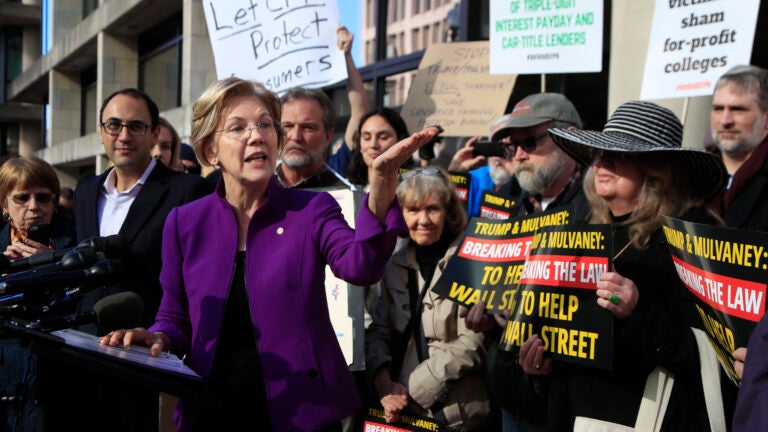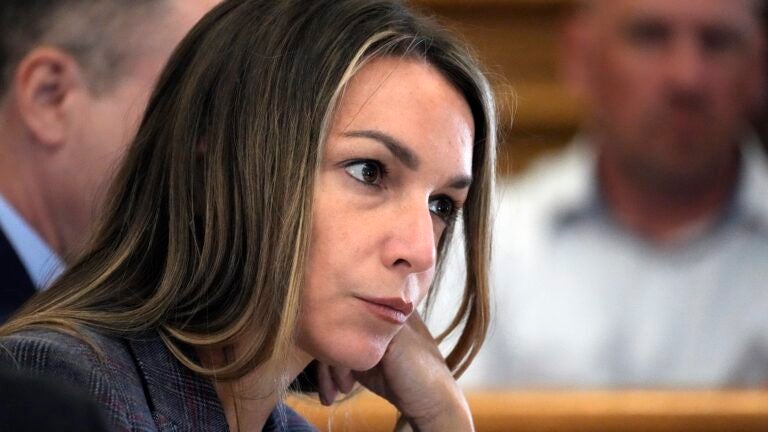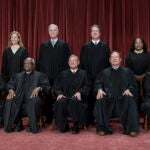The story behind the strange controversy engulfing Elizabeth Warren’s brainchild agency
There are two people claiming to be the acting director of the CFPB this week. There can only be one.

Two different people began this week claiming to be the rightful acting director of the Consumer Financial Protection Bureau, throwing the agency originally conceived by Sen. Elizabeth Warren into one of the stranger, if toned-down, controversies of President Donald Trump’s administration.
“This isn’t about politics,” Warren said at a rally Tuesday outside her brainchild’s headquarters. “This is about what is fair.”
It’s also about what is legal. And the answer is very different depending on who you ask.
What is the CFPB?
The idea of the CFPB was first proposed by Warren in a 2007 paper, in which the then-Harvard Law School professor argued that financial products, such as mortgages, loans, and credit cards, “should be subject to the same routine safety screening that now governs the sale of every toaster, washing machine, and child’s car seat sold on the American market.”
Following the financial crisis, Warren’s proposal was adopted and established by the Wall Street reform act known as Dodd-Frank, which enacted a sweeping array of changes to the financial regulatory system. The 2010 law structured the CFPB to operate with unusual independence from Congress and the executive branch in its mission to protect consumers and punish those who break financial laws.
Even under the Trump administration (which has otherwise moved to roll back financial regulations) the CFPB has continued to pursue its mission, which has included cracking down on debt collectors, payday lenders, and banks. And while Republicans overturned a recent rule that allowed class-action lawsuits against banks, The New York Times reported in August that White House officials concluded the agency was too popular to pick a public fight with.
Well, so much for that.
How did this fight start?
CFPB Director Richard Cordray, whose five-year term was set to expire next July, announced his resignation earlier this month, in a move that allows him to launch an expected 2018 gubernatorial campaign in his home state of Ohio. Before departing, Cordray appointed the agency’s chief of staff, Leandra English, as its official deputy director on Friday — which, under Dodd-Frank, also made English the CFPB’s acting director after Cordray left until a new director was appointed by Trump and confirmed by the Senate.
However, the White House responded the same day by announcing that Trump was designating Office of Management and Budget Director Mick Mulvaney as the CFPB’s acting director.
Officials said that Trump was able appoint Mulvaney to the interim position under a law called the Federal Vacancies Reform Act. The 1998 law says that the president can appoint an “acting official” to temporarily fill a position that requires an appointment by the president, unless another law expressly calls for an alternative means of filling said position.
For his part, Trump himself weighed in over the weekend, calling the agency a “total disaster” under Cordray and promising to “bring it back to life,” which prompted a rebuttal from Warren, who said the CFPB was an example of “government that works for the people.”
The Consumer Financial Protection Bureau, or CFPB, has been a total disaster as run by the previous Administrations pick. Financial Institutions have been devastated and unable to properly serve the public. We will bring it back to life!
— Donald J. Trump (@realDonaldTrump) November 25, 2017
The @CFPB has returned $12 billion to working families who were cheated. That’s government that works for the people, @realDonaldTrump.
— Elizabeth Warren (@SenWarren) November 25, 2017
Before his appointment as OMB director, Mulvaney was among a number of Republicans in Congress who fought against the CFPB, calling the agency a “sick, sad” joke and cosponsoring legislation to get rid of it altogether.
“I don’t like the fact that CFPB exists, I’ll be perfectly honest with you,” Mulvaney said during a 2015 congressional hearing.
The prospect of Mulvaney leading the CFPB alarmed the consumer agency’s progressive supporters. But regardless of their opposition to Mulvaney himself, many — including English and the some of the agency’s founders — argue that Trump doesn’t have the authority to appoint an interim CFPB director in the first place.
What is the argument that English is the acting director?
After the two dueling appointments were made last week, supporters of English argued that the CFPB was exempt from the Vacancies Act, in keeping with the agency’s broad independence. Warren, for example, tweeted that Trump can’t legally override Dodd-Frank, which states the deputy director shall serve as acting director in the “absence or unavailability” of the director.
The Dodd-Frank Act is clear: if there is a @CFPB Director vacancy, the Deputy Director becomes Acting Director. @realDonaldTrump can’t override that. pic.twitter.com/r949ccaJAb
— Elizabeth Warren (@SenWarren) November 25, 2017
.@realDonaldTrump can nominate the next @CFPB Director – but until that nominee is confirmed by the Senate, Leandra English is the Acting Director under the Dodd-Frank Act.
— Elizabeth Warren (@SenWarren) November 25, 2017
Legal experts have noted that an earlier version of Dodd-Frank had said the Vacancies Act applied to the CFPB — but the final version of the law replaced that language with the provisions Warren cited above.
“In other words, Congress knew very well how to say that the FVA applies … but ultimately decided that it would not apply,” Georgetown Law School professor Adam Levitin wrote earlier this month.
Congressional Democratic aides and law professors subsequently told The Intercept last week that they believed CFPB’s own statue has the authority on its line of succession. Former Rep. Barney Frank, who co-authored Dodd-Frank, told CNN that English is “clearly” supposed to be acting director and that legislators deliberately crafted the law to be exempt from the Vacancies Act.
Barney Frank: Deputy Director Leandra English should “clearly” be the one to lead the Consumer Financial Protection Bureau https://t.co/SAtdaGAfRv
— CNN This Morning with Kasie Hunt (@CNNThisMorning) November 27, 2017
Mike Calhoun, the president of the Center for Responsible Lending, told the Washington Post that the issue is “plain and simple.”
“If the CFPB Director steps down, the Deputy Director assumes the role of Acting Director until the President nominates, and the Senate confirms, a permanent Director,” Calhoun said. “This unlawful, backdoor approach of appointing Mick Mulvaney as leader of the Bureau circumvents regular order.”
What is the argument that Mulvaney is the acting director?
The White House sees things differently.
In an eight-page memo issued by the Department of Justice, officials wrote that the CFPB’s own statute “does not displace the President’s authority” under the Vacancies Act, despite its indepedence since Congress designated it as an executive branch agency. Additionally, the Trump administration argues that the CFPB’s language is “unusual” and vague about its line of succession in the case that a position becomes vacant.
Perhaps surprisingly, the CFPB’s own in-house lawyer concurred, advising the agency’s leadership team in a memo over the weekend that Mulvaney was the acting director.
CFPB General Counsel Mary McLeod wrote that she found the arguments that the agency was structured to be exempt from the Vacancies Act “unpersuasive,” pointing out that the director position was entirely different in the earlier version of Dodd-Frank:
In the House-passed version of the CFPA, the Director was to lead the agency only during the initial two-year period from the date that the Bureau’s authorities were first transferred to it, after which all of the Director’s authorities would have been assumed by a Commission. Given that this was not the structure for the Bureau ultimately adopted in the CFPA, the significance of this provision—and its absence from the final bill—is limited. Further, even to the extent this legislative history is nonetheless relevant in interpreting Section 5491(b)(5), one could just as easily argue it shows that Congress was aware that the FVRA generally applies, and chose not to preempt it by either expressly exempting the succession from the FVRA, or by expressly providing for the Deputy Director to serve in the event of a “vacancy” or “resignation.”
White House spokeswoman Sarah Huckabee Sanders said in a statement Sunday that McLeod’s opinion made it clear “there should be no question” that Mulvaney is the the CFPB’s acting director.
So what happened this week?
English filed a lawsuit Sunday to block Trump’s appointment of Mulvaney. However, that didn’t stop both self-proclaimed acting directors from showing up to work.
Mulvaney arrived at the agency’s headquarters early Monday morning carrying a bag of doughnuts and was pictured before 8 a.m. in the director’s office.
https://twitter.com/CZ/status/935130269857779712
With almost comedic timing, English reportedly sent an all-staff email, signing off as the acting director. That email was followed by another a few hours later from Mulvaney, also signing off as “acting director,” telling CFPB employees to “disregard any instructions you receive from Ms. English in her presumed capacity as Acting Director,” according to Reuters.
https://twitter.com/TomNamako/status/935166523290931202
We actually have two people claiming to be the CFPB acting director and this is *not* a romantic comedy where they fall in love at the end. pic.twitter.com/R80kPJdQrN
— Matt Fuller (@MEPFuller) November 27, 2017
In his first day on the job, Mulvaney implemented an agency-wide freeze on hiring and new regulations. In a press conference, he said the president directed him to “fix” the agency, which he said had gone “too far” in making it “difficult for financial services to flow.”
Mulvaney on Trump’s expectations for him as head of CFPB:
“He wants me to get it back to the point where it can protect people without trampling on capitalism.”https://t.co/fXebMBvCbA
— NBC Politics (@NBCPolitics) November 27, 2017
English’s lawsuit was heard in court Monday by Timothy Kelly, a federal judge recently appointed by Trump. Kelly denied English’s request for a temporary restraining order on Mulvaney’s appointment Tuesday, but acknowledged the case raised “constitutional issues,” according to the Post.
English’s lawyer, Deepak Gupta, signaled the legal battle was not yet over and, according to the Post, said his client was weighing her next steps. Brett Shumate, the lawyer representing the Trump administration in the case, reportedly told Kelly that he could not guarantee that English would not be fired in the meantime.
What are Warren’s worries?
The Massachusetts Democrat is not standing idly by as her agency is seemingly engulfed in crisis.
In addition to rallying outside the CFPB headquarters, Warren sent a letter Tuesday to the White House raising logistical and ethical concerns about Mulvaney serving as both the director of the OMB and the acting director of the CFPB at the same time.
Additionally, she says the arrangement creates the potential that Mulvaney, who reports to Trump as OMB director, would be “beholden” to the president as interim CFPB director, compromising the intended independence of the agency.
“Donald Trump doesn’t get to manipulate this agency through the backdoor by claiming that he’s got an interim director, who also works for him,” she said during an appearance Monday on the podcast Pod Save America.
While encouraging Trump to nominate a permanent director, Warren has also reiterated her worries this week about the administration’s large-scale impact on the core mission of her brainchild agency.
“This is about whose side President Trump is on — big banks, or working families,” Warren told the Post. “So far in his administration, he has chosen the big banks time after time.”
However, it was Frank, a fellow Massachusetts Democrat, who perhaps cut to the heart of the more immediate legal debate concerning the CFPB’s leadership during an appearance Tuesday on CNBC.
“I think my side is right,” he said. “But it is also clear that people’s view of the law here on the whole is influenced by what they want to see.”







